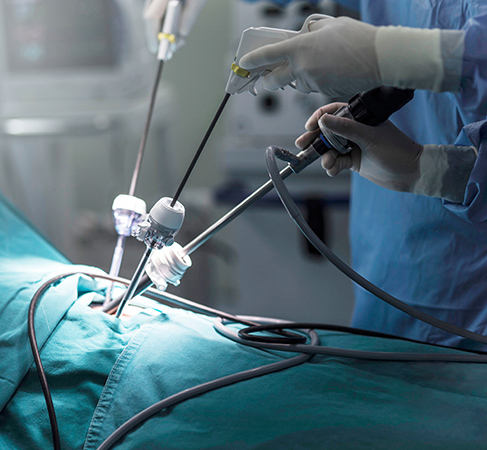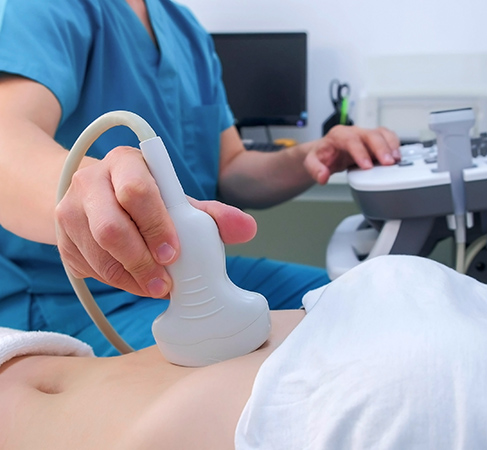GASTROENTEROLOGY INSTITUTE
The new Gastroenterology Institute will provide a comprehensive spectrum
of services, offering patients access to leading-edge diagnostics and
interventional procedures right here at home.
FRENCHMAN’S CREEK CENTER FOR DIGESTIVE HEALTH
Every year, more than 34 million people in the United States are affected
by a digestive disorder. Patients seeking care for gastrointestinal conditions
at Jupiter Medical Center are cared for in the Frenchman’s Creek
Digestive Health Center. The sophisticated facility was made possible
by a generous donation from the Frenchman’s Creek Men’s Health
Day Tournament received during the campaign’s first phase. Services
include advanced, therapeutic endoscopic treatments, the latest minimally
invasive surgical and interventional treatments, and access to novel therapies
and clinical trials. As the campaign enters its second phase, philanthropic
support is sought for the creation of a comprehensive, new resource that
takes the achievements and successes of our digestive health specialties
to a new level: the Jupiter Medical Center Gastroenterology Institute.

TECHNOLOGY
Jupiter Medical Center is committed to staying on the cutting edge of gastroenterology
diagnostics and treatments. We have acquired equipment to perform radiofrequency
ablation for Barrett’s esophagus, esophageal and anorectal motility
studies, Bravo pH studies, and capsule endoscopy.
We were the first medical center in Florida to acquire the CONMED 3D Advanced
Visualization System™ for bariatric surgery. We will soon be purchasing
additional technologies that will provide new diagnostic and therapeutic
options for complicated gastrointestinal and hepatobiliary disease in
South Florida. These include the Spyglass® Direct Visualization System
that allows physicians to view the bile duct and liver, and the endoscopic
functional luminal imaging probe (EndoFLIP) that allows physicians to
more accurately identify patients who may benefit from a surgical approach
to gastroesophageal reflux disease.
Even colonoscopy, the gold standard for colorectal cancer prevention, is
in a constant state of evolution. Soon, another generation of colonoscopes
with even more sophisticated optics will be released.
EXPANDING OUR SERVICES
Jupiter Medical Center’s patient and procedure volumes have risen
since the Digestive Health Center’s opening. However, we are not
yet able to offer the latest therapies for all gastrointestinal conditions.
To address such needs, deepening our roster of experienced, fellowship-trained
gastroenterologists and endoscopists is a top priority.

Additional philanthropic support will also make it possible for the gastrointestinal
team to expand and build out advanced suites that enable surgeons and
endoscopists to collaborate on multiple procedures at one time.
HEPATOBILIARY AND PANCREATIC CANCER PROGRAM
The Hepatobiliary and Pancreatic Cancer Program will become the region’s
foremost diagnostic and treatment center for patients with liver and pancreatic
diseases, including disorders of the liver, bile ducts, gallbladder and
pancreas. Surgical procedures for these diseases are usually advanced
and complicated. Special training and skill are required to ensure the
best possible outcomes for patients. This program, once developed, will
be multidisciplinary with the latest technological advancements.
With the recruitment of Dr. Shanel Bhagwandin, Medical Director for the
Gastrointestinal Surgical Oncology program, Jupiter Medical Center is
able to offer complex liver resections, the Whipple procedure, microwave
ablation, and is seeing regional referrals of patients that have complicated
injuries to the bile duct during routine cholecystectomy. As the only
board-certified surgical oncologist in Martin, Indian River, St. Lucie
and Palm beach counties, Dr. Bhagwandin also performs the Hyperthermic
Intraperitoneal Chemotherapy (HIPEC) procedure for patients with cancer
that has spread to various areas in the abdomen. HIPEC is a highly concentrated,
heated chemotherapy treatment that is delivered directly to the abdomen
during surgery. Before HIPEC is administered, the surgeon—using
standard surgical methods—will remove all visible tumors that can
be removed throughout the peritoneal cavity. This is known as cytoreductive surgery.

MEETING THE CHALLENGES
New insights into the intricate workings of the digestive tract, the precursors
of serious disease, and the course of disease for cancers that affect
digestive organs, are constantly propelling new treatment strategies and
technologies. The Gastroenterology Institute is on course to provide a
comprehensive spectrum of services that will allow community members,
with virtually any gastrointestinal condition, to access the specialized,
diagnostic and interventional procedures they require right here at Jupiter
Medical Center.